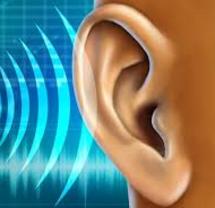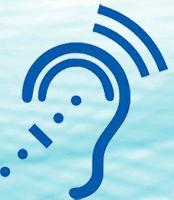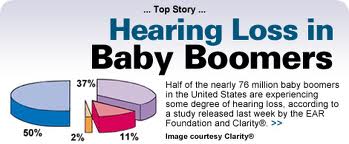Long Island (516) 731-5868 Queens (718) 641-3817
HARMONY
Hearing & Speech Center
 | ||||
If you answered "Yes" to one or more of these questions, it is not a surprise. That is because you are a member of the "Baby Boomer" club. You were born and have lived in times filled with loud music, loud machinery, as well as all different types of electronic gadgets, which have slowly been impacting on your hearing. Hearing loss is gradual, but has been documented by many research studies as being most significant for individuals who were born 20 years after World War II. The National Center for Health Statistics has reported 26 percent more hearing loss among those in the 46 to 64 age bracket than in past generations. That translates into about 16 million persons in that age group suffering some degree of hearing loss.
In October 2006, The Ear Foundation reported through a national survey that"hearing loss has become a serious health issue for aging Baby Boomers - impacting their work and home lives - yet most are not seeking help". Baby Boomer's appear not to be seeking the help they need due to a stigma that "hearing loss effects only the older population". However, according to The American Speech-Language-Hearing Association about 28 million Americans of all ages suffer from hearing loss, but, the number of people between age 46 to 64 experiencing hearing loss has increased 26% between 1971 and 1990 and will continue to increase as the Baby Boomer population continues to age. Hearing loss will continue to increase not only among the Baby Boomers, but all individuals today. Most people will be exposed to environmental noises such as construction, automobiles, buses, trains, and airplanes, for example. They will also be exposed to noise received from social gadgets such as mini-IPods, loud car stereos, surround sound stereo systems, theatre, movies as well as other social events which expose them to high volume sounds and music.
The National Health Survey further states that there are already more baby boomers suffering from moderate to severe hearing (10 million) than there are hearing impaired Americans above age 65 (9 million).
Therefore, we can conclude that hearing loss does not only effect "the older" generation. It effects persons of all ages with the Baby Boomer generation winning the race as having the most people age 46 to 64 with prevalent hearing loss.
Since, the Baby Boomer population is currently working and will most likely continue to work past the retirement age of 65 it is imperative to identify hearing loss, accept hearing loss and seek assistance to improve hearing function in the work environment, at home and in social situations.
Hearing loss can ultimately impact one's ability to perform efficiently at work and can result in loss of promotions and other advancements within the work environment. In addition, hearing loss will impact on an individual's overall ability to communicate effectively with family and friends resulting in a decrease in the individual's desire to participate in a variety of activities that were and can continue to be enjoyable to the person.
Some of the signs of hearing loss to be aware of are the following:
1. You feel that you must concentrate to hear someone talk or whisper.
2. You have difficulty hearing the TV.
3. You have difficulty hearing conversation at meetings or other gatherings.
4. You have difficulty communicating in a small group of people.
5. You have difficulty communicating in noisy environments, such as at a party or in a bus
or car.
6. You have difficulty hearing someone calling you from another room.
7. You complain that other people are mumbling.
8. You frequently need to ask people to repeat themselves.
9. You have difficulty hearing the doorbell or telephone ringing.
10. You find yourself reading the lips of people who talk to you.
11. Family and friends are noticing that you are not hearing well.
Since, hearing loss usually develops gradually the symptoms are often difficult to recognize until the loss becomes more moderate to severe.
Therefore, don't wait until your hearing loss is significant enough that it impacts on activities of daily living. Even mild hearing loss will have subtle signs which will alert you to a potential problem. The first thing to do is to schedule an appointment with a Licensed Audiologist for a complete audiological evaluation. At the conclusion of the testing, the Audiologist will discuss the results of the test, determine if hearing loss exists and will review recommendations with you.
If your hearing loss is mild and you are not a candidate for a hearing aid then one recommendation will be to have your hearing monitored on a yearly basis. Other recommendations may include suggesting to the speaker that they face you when he/she speaks and that you should minimize the distance between you and the speaker when conversing. You may receive a recommendation to consider using an assistive listening device for TV and/or the telephone.
If results of the hearing test reveal a more significant hearing loss then a recommendation to be fitted with hearing aids will be made. Remember, baby boomers are used to "gadgets". Hearing aids are minaturized electronic gadgets which provide amplification to improve your hearing. They come in a variety of sizes and styles which will be custom designed to accommodate your individual hearing needs.
Today's hearing aids are also digital so the signal can be adjusted to provide you with sound that is natural in a variety of situations. Most digital hearing aids will have several programs that can be adjusted to specific listening situations. For example, Program 1 will be tailored for your work environment while Program 2 will be adjusted for the theatre.
To conclude, hearing loss is not to be looked upon as a stigma associated with "older" people. Hearing loss effects all ages, however, the largest group of individuals presently effected by hearing loss are the Baby Boomers (age 46 to 64) and mostly the male Baby Boomers as the result of their exposure to a greater amount of exposure to noise in the environment as well in the employment setting.
Watch the following video about the latest hearing aid technology available today. This is the smartest hearing aid now available manufactured by GN Resound and it works with your Apple iPhone, iPod and iPad. It is amazing!!
Finally, it is advised to schedule a routine audiological evaluation to determine your threshold of hearing. Remember, don't put off until tomorrow what you can hear today.
For More Information And To Schedule Your Appointment Call Us:
Long Island
432 Gardiners Avenue
Levittown, NY 11756
(516) 731-5868
Queens and NYC
161-24 84th Street
Howard Beach, NY 11414
(718) 641-3817
Are you between the age of 46 and 64 years old?
Do you remember those loud concerts, disco's and other evening clubs?
Do you experience "ringing" or "buzzing" in your ears?
Do others say you turn your TV too loud?
Do others accuse you of not paying attention?
Do you mistake spoken words or numbers for similarly sounding words or numbers?
Do you miss the punch line of jokes?
Are you avoiding lectures, plays, movies or other social activities?
Are you experiencing difficulty hearing at work and or home?



